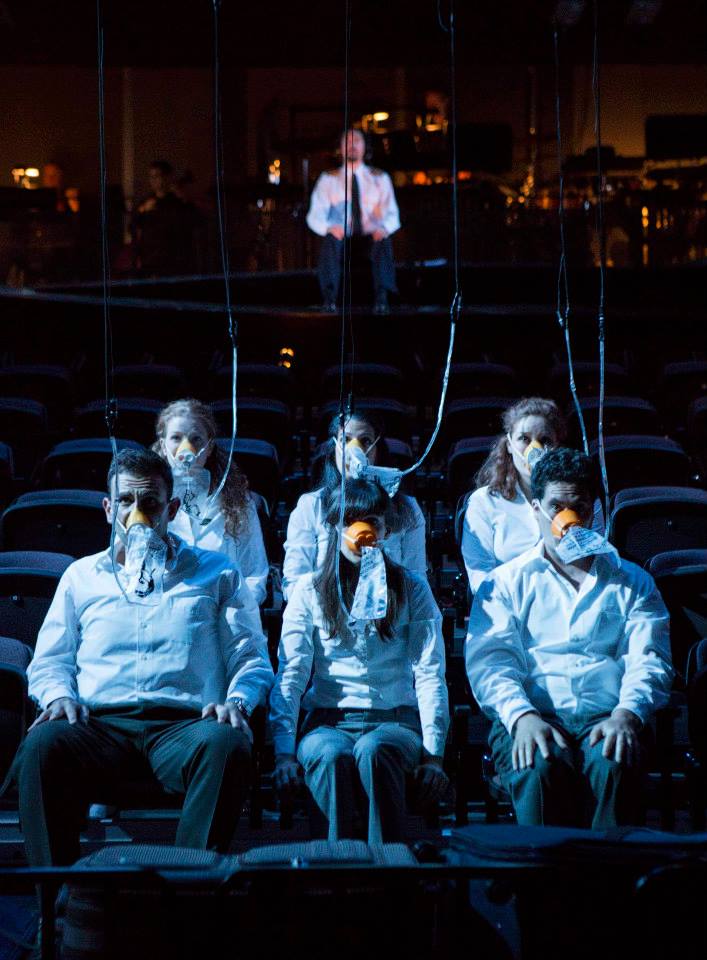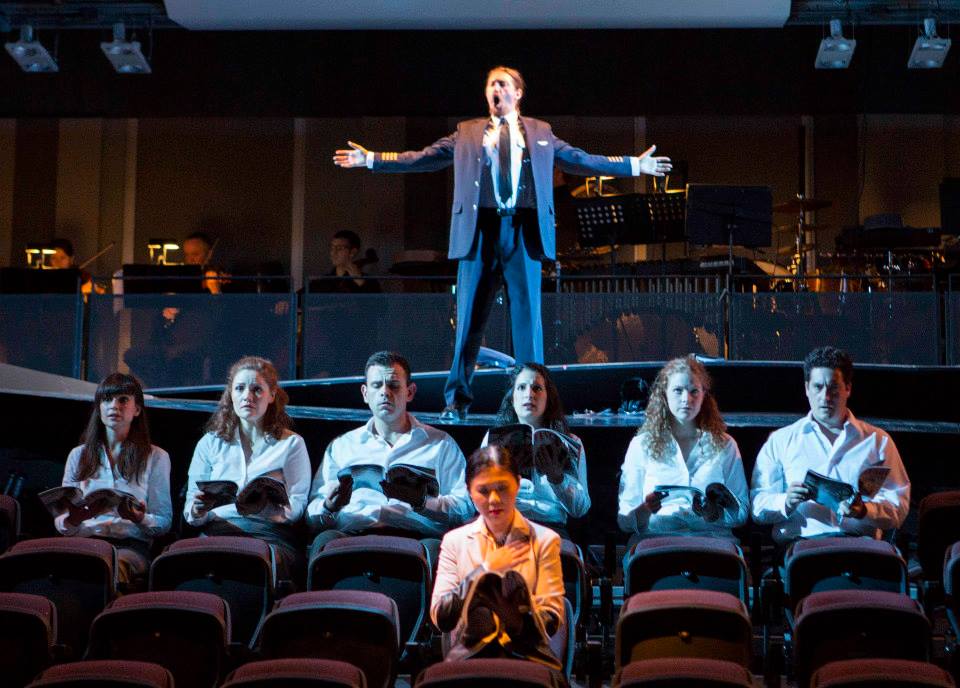View more photos below - click here
OVERVIEW
| Role | Voice Type | Range ? | Character Description |
|---|---|---|---|
| Worker | middle-low | An airline worker | |
| Business Man | low | A plane passenger | |
| Ad Exec | high | A plane passenger | |
| Scholar | middle | A plane passenger | |
| Flight Attendant | middle-high | A flight attendant, dissatisfied with her job | |
| Voices | high | SSAATB | Chorus |
SYNOPSIS
A worker ruminates on the terrifying power of flight as he loads bags. Three passengers board and discover they’re sitting beside each other. During the pre-departure safety demonstration, a flight attendant longs for an escape from her mundane life and job. The three passengers think of their own isolation and longing and fear. The flight takes off, each of them is alone with their personal fear and sadness, underscored by a collective, mythic fear and sadness.
When the flight is in the air, the interpersonal dynamics of the three passengers and the flight attendant are exposed — the Flight Attendant desires the Business Man, the Business Man desires the Ad Exec, the Ad Exec longs for someone (but who?) and the Scholar is so trapped by his mythic personal fear that he can’t see anyone outside himself. Tension builds as desires are left unfulfilled. The Scholar and Ad Exec talk about Icarus; a myth that frames their personal longings and sadness.
Turbulent desires grow too strong. The people release or crack. The myth beneath overwhelms them like waves. The pilot, in a state of bliss, saves the plane from terror and sadness.
When the characters re-appear, they have been transformed by releasing or cracking into myth. The Business Man and Flight Attendant have been calcified by it, stuck into their roles. The Scholar can see another person now — he speaks his feeling to the Ad Exec. The Ad Exec, in turn, can now reach out to him. She does. The Scholar sings a fearful aria surrounded by angelic voices.
PREMIERE PRODUCTION INFORMATION
| Role | Name |
|---|---|
| Dawn Bailey | |
| Vania Chan | |
| Sean Clark | |
| Alexander Dobson | |
| Larissa Koniuk | |
| David Roth | |
| Zorana Sadiq | |
| Geoffrey Sirett | |
| Krisztina Szabó | |
| Jennifer Taverner | |
| Graham Thomson |
| Role | Name |
|---|---|
| Director | Tim Albery |
| Music Director | Brian Current |
| Set & Costume Design | Teresa Przybylski |
| Lighting Design | Kimberly Purtell |
| Stage Manager | Kristin McCollum |
CREATION
DEVELOPMENT
Airline Icarus is about the intersecting thoughts of passengers aboard a commercial airplane. It explores themes of hubris mixed with technology, the forced intimacy of strangers and flying too close to the sun. Over the course of the work, the plane becomes brighter and eventually vanishes.
In September of 1983, a Korean commercial flight was shot down over the Soviet Union’s eastern coast. The Soviets said they thought it was a spy plane. Rather than hit the plane directly, the missile struck its wing, and the plane “fell like a leaf for an excruciating 12 to 15 minutes.” I couldn’t help but to think about the people aboard for years after. Later when visiting with Anton Piatigorsky, a fantastic playwright living in Toronto, I told him I was looking for ideas about theatrical works and mentioned the Korean airliner. Anton told me that he had just written a poem about the absurd little society we often take for granted aboard commercial flights and the unsettling mixture of hubris and technology: we’ll make small talk and watch movies while inches outside the window is a glorious cloudscape or freezing certain-death.
He also proposed the perfect metaphor for what we were trying to do: Icarus. Icarus, you’ll remember, flew too close to the sun and his wax wings melted and he fell to the earth in a blaze of light. His father, Deadalus, looked for him, crying: “Icarus, where are you!” and “Damn this art!”
To me, one of the most interesting parts of the myth is that Icarus disappears, in much of the same way that people involved in airline tragedies disappear, or the way the astronauts of the Space Shuttle Columbia disappeared in a blaze of light over Texas.
Deadalus’s cries of “Damn this art” are heartbreaking, not so much because Icarus has crashed and died, but more that he knows that we are doomed to keep building things - airplanes, computers, operas - in an endless cycle of trial and error that sometimes leads to disastrous consequences.
The development of Airline Icarus has followed a circuitous path to production and I’m very grateful to all the directors, curators and musicians who have supported the piece along the way. The work was commissioned in 2001 by Opera Breve Vancouver and composed between 2001 and 2005 in consultation with their director, the inimitable John Juliani. Workshops and excerpts were presented by Tapestry New Opera, Soundstreams, New York City Opera Vox Festival, Fort Worth New Frontiers and upcoming at Opera America in New York in 2014. In 2011, Airline Icarus was awarded the Italian Premio Fedora Award by a jury chaired by Louis Andriessen and received a staged premiere in Verbania Italy in April 2011, where I had a wonderful time on the podium working with passionate actors, designers and musicians from the Milan area.
In November 2012 it was presented in concert at The Royal Conservatory in collaboration with Maniac Star, the rehearsals of which formed the basis of a NAXOS recording which will be released this fall. I can’t tell you how thrilled I am that the fully staged Maniac Star production of Airline Icarus, directed by Tim Albery, will be presented as the final Soundstreams event of this season. Huge thanks go to Lawrence Cherney, who has been following the development of the piece since those early workshops in Vancouver, and to all those at Soundstreams for making this production possible.
- Brian Current, composer
AWARDS
2014 - Dora Awards Nominations:
Outstanding New Opera
Outstanding Music Direction (Brian Current)
Outstanding Production
Outstanding Set Design (Teresa Przybylski)
Outstanding Performance by an Ensemble
ADDITIONAL RESOURCES
MEDIA
There are no reviews yet. Be the first one to write one.
REVIEW THIS OPERA
You must be logged in to submit a review.
Submit a Suggestion
Please Note: As we try our best to ensure that all the data on this page is correct please understand that these pages were built by humans, so we're bound to make mistakes. Let us know if you have found any errors, typos, or mistakes on this page. If you have any suggestions on adding tags to this page, please use this email link as well. Thank you, your help and contribution are appreciated.











